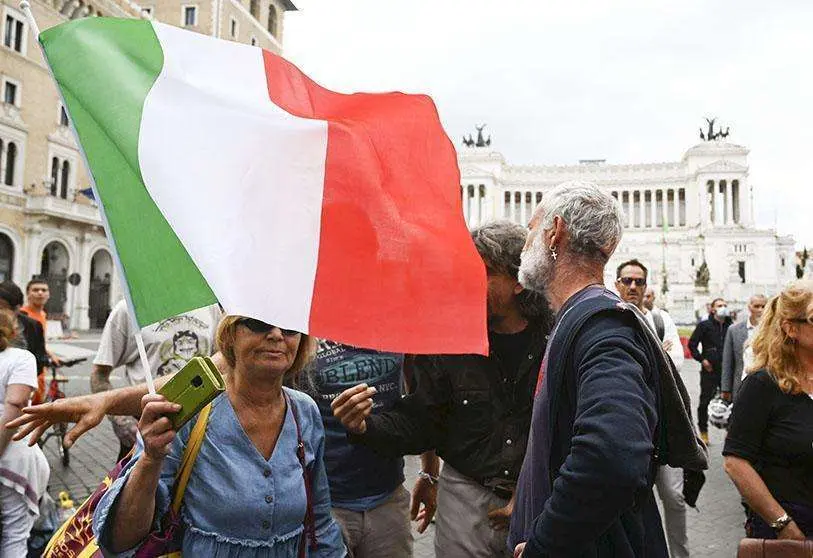Italy surrenders to the far right

It is not just Italy, in fact the spectre of the far-right has been haunting a good part of European governments whose democracies suffer tremendous shocks as the economic and social panorama worsens and voters experience a polarisation that leaves some citizens sceptical not to go to the polls and others so angry and irritated that they decide to vote for the worst extremes. When things go wrong, the same demons return.
Italy, the third largest economy in the European Union (EU), already has its own: the young Giorgia Meloni, 45, will be its new prime minister, ready to continue making history in the country of the boot, not only for being the first woman to reach such a high position, but also to do so with a party she founded herself called Brothers of Italy, after being a precocious neo-Nazi political activist.
A few days ago, it was Sweden that shook up the European political spectrum with Jimmie Akesson, 43, as the strong leader of the Sweden Democrats, practically bringing the far right into a country that had remained under moderate governments over the years.
In Italy, the right-wing coalition of Meloni, Matteo Salvini's League and the incombustible Silvio Berlusconi's Forza Italia won 42% of the vote, according to preliminary data.
Undoubtedly, the most surprising thing is how Brothers for Italy has risen like wildfire in the preference of voters who in 2018 gave it 4% of the vote and four years later, according to the first counts, 25%.
At the international level, this four-year period has been marked firstly by the trade-tariff war between the United States and China, secondly by the outbreak of the pandemic in 2020, and then by the invasion of Russian troops into Ukraine since 24 February. The persistent imbalance in commodity markets and the difficulties in getting them to international buyers in time are leaving many companies on the brink of closure, workers unemployed and families paying high prices for food and living.
In Sweden, the far right blames globalisation for all the ills of its economy. In Italy, the far-right blames all the ills of its economy on illegal immigration and is also throwing a spanner in the works against the European Union (EU) and membership of the eurozone with the euro as the common currency.
Meloni, who will have to govern by getting along with Salvini (who is not exactly known for his ability to reconcile and is an open Europhobe), has promised a cascade of palliative measures to help businesses and families to weather the current economic storm, which will not exactly be temporary, neither in Italy nor in the rest of Europe.
The new prime minister has promised lower taxes, energy aid, subsidies and a tough hand against illegal immigration and, for the time being, has shelved her criticism of the EU, although Salvini's pressure for Italy to leave the euro will not be few. For the time being, Meloni says they agree to remain in NATO and says she will not change her position on Ukraine, although once again Salvini of the League and Berlusconi of Forza Italia, the party with which she will also have to form a government, are open friends and admirers of Putin. This time the tables may turn, leaving behind the "gatopardismo" of the past in a country characterised by political instability, which in 67 years has seen 31 prime ministers.
How long will Meloni last in power? Whatever Salvini wants, in fact, he already broke the coalition in August 2019 that he had with the anti-establishment Five Star Movement (M5S), the ultra-leftists who then tried to govern with the ultra-right, which in the elections a year earlier had won a historic 32% of the vote.
In four years the Italian voter has gone from feeling represented by the ultra-left to placing his or her trust in two far-right parties, Meloni and Salvini. Sparks will fly between two such strong egos, each trying to impose their own vision of the ultra or fascist government that will rule the Italians.
The Italian dictator, Benito Mussolini, was eventually shot on 28 April 1945 and his corpse was left to the wrath of the Milanese, who left his body hanging in Piazza Loreto in the capital. For many years there was no more talk of fascism until the beast was reawakened in the younger generations of the working class and marginalised neighbourhoods who, like Meloni, believe that the different, the dissimilar and those who come from outside are only threats. Meloni believes that Mussolini was a hero who only loved Italy very much.
History books say that nobody killed more Italians than Mussolini, what a way to love Italy. The real problem is that the younger generations who decide to resurrect demons ignore history and live an imaginary of a better time that was not so and try to bring it back to the present.
Ultra ideologies, left or right, are permeating because the centre is weakening and abstention and ostracism are contributing to this. Enrico Letta, with his Democratic Party, will be the second force in Italy; he has been affected by the abstention that has grown again.
Italy's path could be the path of other European economies. Here in Spain, the far-right political formation VOX has already invited Meloni to come and celebrate her victory. VOX see themselves forming a government in 2024 with the Popular Party.

